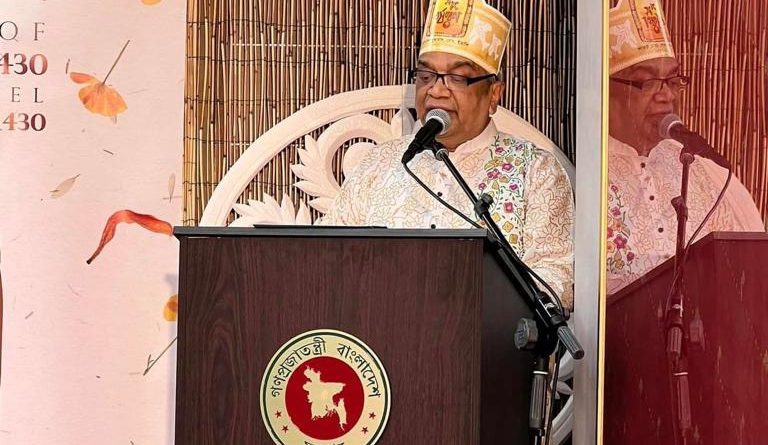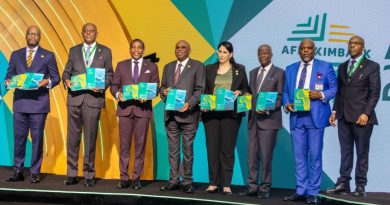Bangla New Year-1430 celebrated in Rome with Colours and Enthusiasm.
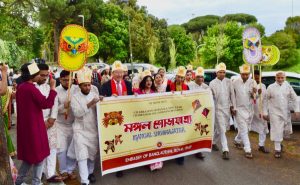
Oru Leonard
To welcome Bengali New Year-1430, a discussion session and colorful cultural programme were organized at the Bangladesh Embassy in Italy on 18 May 2023.
The rich culture and long heritage of Bangladesh were highlighted at the colorful event showcasing traditional pitha (cake),melodious songs, spectacular dances and culinary traditions. 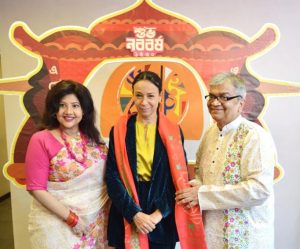 The event was attended by high-ranking officials of Italian Foreign and other Ministries, Ambassadors/ Permanent Representatives of various countries, a good number of diplomats, senior Managers of the UN system, representatives of Italian civil society, journalists, artist and Honorary Consuls of Bangladesh as well as officers and officials of the Embassy and Consulate General in Milan.Ambassador Md. Shameem Ahsan and his wife Pandora Chowdhury warmly welcomed the guests with traditional Boishakhi scarf (uttorio) and exchanged New Year greetings with them.
The event was attended by high-ranking officials of Italian Foreign and other Ministries, Ambassadors/ Permanent Representatives of various countries, a good number of diplomats, senior Managers of the UN system, representatives of Italian civil society, journalists, artist and Honorary Consuls of Bangladesh as well as officers and officials of the Embassy and Consulate General in Milan.Ambassador Md. Shameem Ahsan and his wife Pandora Chowdhury warmly welcomed the guests with traditional Boishakhi scarf (uttorio) and exchanged New Year greetings with them.
A large number of foreign guests alongwith the members of the Embassy family participated in the traditional procession for wellbeing (Mangol Shovajatra) with great enthusiasm and festivity organized on the road in front of the Embassy.
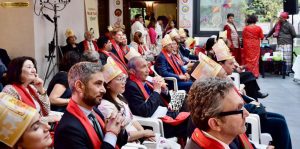
In his welcome remarks, the Ambassador highlighted the richness of Bengali culture and mentioned the recognition of Mangal Shobhajatra by UNESCO as “Intangible Cultural Heritage of Mankind” as a result of Prime Minister Sheikh Hasina’s diplomatic initiative and said that it adds a new dimension to Bangla New Year celebrations.
The Ambassador recalled with deep respect the Father of the Nation Bangabandhu Sheikh Mujibur Rahman for the recognition of Pahela Baishakh as a public holiday and initiating observance of the day with celebratory activities.
Minister Alessandra Schiavo, Central Director of the Asia Division of the Ministry of Foreign Affairs and International Cooperation of Italy, was present at the event as “Guest of Honour”. 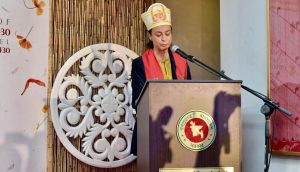 In her speech, she praised the Bangladesh community in Italy and highlighted the importance of the integration of the Bangladesh community in Italy with the Italian language and culture while underlining retention of their own cultural identities and practices.
In her speech, she praised the Bangladesh community in Italy and highlighted the importance of the integration of the Bangladesh community in Italy with the Italian language and culture while underlining retention of their own cultural identities and practices.
Ms. Alessandra Schiavo further mentioned that the Bangladeshi diaspora in Italy are making appreciable contributions to the social and economic sector of Italy. Highlighting various aspects of the significant improvement in Italy-Bangladesh friendly bilateral relations in recent times, she highly lauded the indomitable progress of Bangladesh.
Dr. Francesco Zanini, a Professor of Lumsa University, Rome and a good friend of Bangladesh, presented the keynote speech in the discussion session. He pointed out that the traditional celebration of the Bengali New Year is a unique symbol of retaining and nurturing the long cultural heritage of Bangladesh. 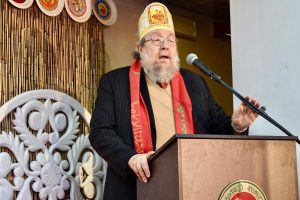 He also highlighted the need to keep the expatriate Bangladeshis connected with their roots. He congratulated the Embassy for the successful and colorful celebration with the foreign friends to welcome the Bangla New Year and emphasized on continuing this practice.A very colourful cultural programme followed the discussion segment with the participation of expatriate Bangladeshi and Italian artists. Rendition of a popular Bengali song by a native Italian young artist held the enlightened guests captivated. On the occasion of Bangla New Year, a colorful and bi-lingual publication of the Embassy was distributed among the guests, which reflected the historical context and other aspects of Bengali New Year to the foreign guests.
He also highlighted the need to keep the expatriate Bangladeshis connected with their roots. He congratulated the Embassy for the successful and colorful celebration with the foreign friends to welcome the Bangla New Year and emphasized on continuing this practice.A very colourful cultural programme followed the discussion segment with the participation of expatriate Bangladeshi and Italian artists. Rendition of a popular Bengali song by a native Italian young artist held the enlightened guests captivated. On the occasion of Bangla New Year, a colorful and bi-lingual publication of the Embassy was distributed among the guests, which reflected the historical context and other aspects of Bengali New Year to the foreign guests.
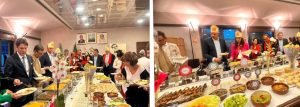 Traditional Bangladeshi cuisine was served for dinner which was highly appreciated by the invited guests. Traditional rural palki and stalls for betel-nuts, henna work, jhal-muri and desi pitha were on display in the Embassy premises which were added attractions at the event and received wide appreciation among the foreign guests, in particular.
Traditional Bangladeshi cuisine was served for dinner which was highly appreciated by the invited guests. Traditional rural palki and stalls for betel-nuts, henna work, jhal-muri and desi pitha were on display in the Embassy premises which were added attractions at the event and received wide appreciation among the foreign guests, in particular.
The Embassy also assumed a festive look as it was tastefully decorated with traditional motifs and other cultural elements of Bangladesh.

